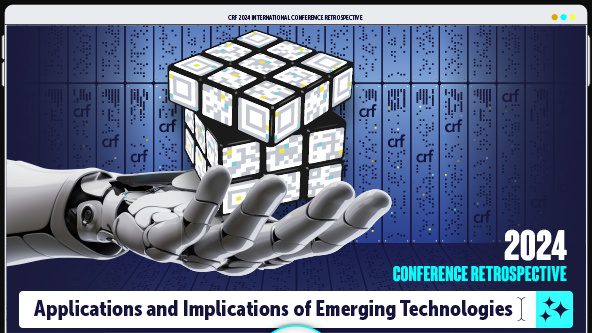AI and Technology
Blog: The Internet Was My Ticket into Journalism: Conversation with Tom Standage
Could you give a brief outline of your background?
I’m a child of the home computer revolution of the 1980s. I had read lots of science fiction and wanted to build AIs and robots.
So, I went to Oxford to do AI and robots. At the time, you couldn’t do Computer Science at Oxford, you had to do it as part of [an] Engineering [degree]. So, I did Engineering with a specialism in Computer Science.
The problem was that this was the depth of what’s now called ‘the AI Winter’. AI didn’t work in the late 80s/early 90s, and it’s only really started working in the last 15 years, so [my original] plan wasn’t going to work. And then the internet came along in the early 90s, just after I graduated, and I knew about it because I used it at university. The newspapers didn’t have anyone who knew about the internet, so I started freelancing for The Guardian, writing about the internet. The internet was my ticket into journalism.
I worked at The Guardian for a year and then the Telegraph for two years [because] all the newspapers had internet supplements. I recognised that this was not a long-term thing, because newspapers don’t have electricity supplements…So, I thought, ‘I should pivot to science and technology journalism.’ I applied for the science correspondent job at the Economist, and because the Engineering degree at Oxford is extremely broad in physical sciences and maths, I [could] cover all sorts of things, [from] space probes and semiconductors [to] computer viruses.
I got promoted and moved from tech journalism to business coverage more broadly. I started to apply the lessons of what tech companies were doing to The Economist itself, and saying, ‘why are we doing this when other companies are doing that? And shouldn’t we be doing this? And shouldn’t we have an app? And isn’t our paywall set up in a rather strange way?’ and so on. [Implementing changes to our digital strategy became my new role.] And so that’s pretty much what I’ve done since about 2010, while still writing and editing.
I now do this from the perch of Deputy Editor, but I have a particular responsibility for thinking about the interface between our journalism and our products and our use of technology.
People say that ‘life is lived forward and understood backwards’ and that’s exactly it. Turns out, now you need coders in the newsroom, and you need people who understand how to use data.
We’re seeing a lot of changes in the workplace at the moment. One of the other Conference speakers, Ravin Jesuthasan, used an aphorism like that: he quoted William Gibson, saying ‘the future is here, it’s just not evenly distributed’. What does that look like in practice?
An interesting place to look to answer some of these questions is how the big tech firms are responding. Because they are canaries in the coal mine in many ways: they have the most demanding and outspoken employees, who can leave and get another job instantly. At the same time, the tech companies have got the most money to spend on perks, so they can afford to try lots and lots of different things, so I think they’re worth watching. The other thing is that there is a long culture of [tech and digital] companies that have been fully remote from day one. So, one of the questions is, what can we learn from their experience about how they do things differently? So, I think there are sort of aspects of the future, there are places to look where you can see what the future might look like and we should do that as much as we can…More generally, technology is a big determinant [of what the future looks like]. It’s not the only one, but it’s a very big determinant of what the future looks like. Economics is another one, and so, being at the Economist I think is the best place in the world to sort of find out what the future is going to look like. Which is, I realized, what I’ve been doing my whole life.
I get to meet the smartest people in the world and ask them whatever I want to ask them, which has been great, and I get to travel all over the place and see bits of the future. I remember going to Tokyo in 2001, they had the first phones with apps and colour screens and cameras, and it was like sci fi – it was amazing. And similarly, every time I go to China, you see three things a day that blow your mind…The culture and use of technology for a long time was defined by what American teenagers would do. [T]hink about the way American teenagers used cars and [went] to the movies. That became globalised, and it’s Chinese teenagers that are [determining] that now. Being able to talk to smart people and travel and see what’s going on around the world, if you’re obsessed with what the future looks like like I am, then that’s great.
What has been your favourite work-related experience in recent years?
In the past few years, I’ve been involved with our Annual which comes out every November, called The World Ahead, and it tells you what we think is going to happen next year. [F]uture gazing has officially become part of my job.
Some of the pieces I’ve most enjoyed doing…I wrote a piece for the 2019 edition, because 1519 was the anniversary of Leonardo da Vinci’s death. So, I imagined him as a time traveller visiting 2019 and I wrote a piece in the voice of Leonardo da Vinci, which was great fun and it’s sort of sci fi.
And then the following year, for the 2020 edition, I did an interview with an AI. Now this has since become quite a hackneyed journalistic trick, but I had enough facility with the code for one of the early big language models that I could basically rig it up so that it could do a Q&A. I interviewed it about what was going to happen in 2020 and, funnily enough, it predicted that Trump would lose the election, which he did.
What is the most recent thing that you wrote?
The most recent thing I wrote is a book review. It’s running in this week’s issue of The Economist, and it’s a book review about ‘The Metaverse: And How It Will Revolutionize Everything’.
Matthew Ball, who is the smartest commentator on the metaverse and, funnily enough, an occasional writer for The Economist, was head of strategy at Amazon Studios, and he’s a very smart guy.
He has written what I think is going to be the definitive book, for the time being, on the metaverse – what it is and what it isn’t – and this is something I’ve been thinking a lot about as well.
I think there is something to the idea of the metaverse and I think the idea of doing more things in immersive virtual worlds, other than just gaming, is going to happen. I don’t know if we’ll call it the metaverse – we don’t call the Internet ‘the information superhighway’ which is what everyone called it in 1992. So, I don’t know about the name, but I think there’s something there.
Writing a book review allows me to give my view on all of these things, and on where I agree and disagree with the with the author. So that’s been very helpful in clarifying my own thoughts on the metaverse.
What are you going to discuss in your presentation at the Conference in October, and why should people want to come and listen?
I’m going to be talking about technology and its role in shaping the future of work…it’s going to be one of the lasting consequences of the pandemic. It’s a massive shift, you know, on a par with switching from working in fields or factories to working in offices.
So the first [element], I think, is that online collaboration tools are really still quite primitive. We’re still talking to each other through grids of rectangles on Zoom. That’s why I think there’s something to the metaverse: there’s more enthusiasm for better ways of interacting than there might have been. But it’s still absolutely, very early days…so there’s a lot of innovation happening there. And that’s a real problem for companies, because how do you know when to jump, and what [you] should adopt? There’s a lot of remote workers and hybrid teams, [who] need to use learn to use these tools effectively.
The next thing is about security and surveillance. Some companies have been monitoring what their remote workers are doing. There’s quite a lot of overlap with corporate culture and trust and that sort of thing. How much surveillance is too much? And I think there’s quite an active debate about that some companies are measuring how much you move your mouse and things like that. The real challenge, I think, is to move to output-based assessment of performance. So, you’ve got a question about surveillance and how you monitor productivity.
Then you’ve also got the question of security. Security [has become] more of a challenge, because we used to think about securing office networks as a perimeter. You went to the office, you use cards to get into the building, and log into your computer. Now, that perimeter has gone away, because a lot of the workforce is actually not in the office and not on the corporate network. So, that’s another big challenge that I think companies need to grapple with.
What I think is really interesting is that, when I last spoke at CRF, the famous paper by Carl Frey had just come out, the paper about automation. It divided the US workforce into different groups, depending on how likely how much risk they face from automation, and the biggest group was this 47% of American workers who were at the highest risk of automation. This was widely reported as ‘half of American workers are going to lose their jobs to robots.’ And that’s not what he said. [He was only assessing the risk to that group, which was still fairly low.]
[Now] here we are again: I’m speaking at another CRF event and Carl Frey has released another paper this year. It’s about technology and collaboration, and the relative effectiveness of in person and remote collaboration. He thinks [hybrid collaboration tools] used to be terrible, and they’ve now got much better and so that the difference between in person collaboration and an online collaboration is pretty small. And in some cases, the online collaboration is actually better, because you can have a wider range of people from different offices around the world so you get a greater diversity of thought in the virtual room. And interestingly, he suggests that we don’t really need to choose one or the other…
So what I would emphasise [is that in] all of these areas, we are very much at the beginning of a change: it’s not going to be something we resolve in the next months or even a couple of years… It’s a very, very big and continuous and evolving change… Software is never finished, right? So, unfortunately, that means that this is a moving target, and we just need to do the best we can.



